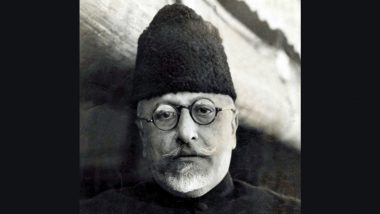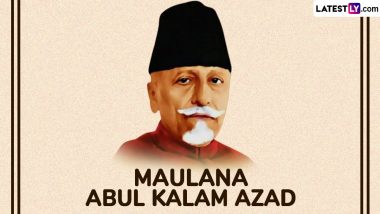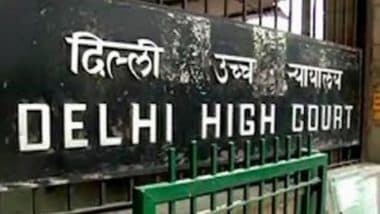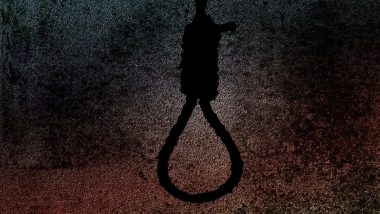Maulana Abul Kalam Azad was a prominent leader of the Indian freedom struggle and a renowned scholar. He was born on November 11, 1888, and served as independent India's first Education Minister. He devoted his life to the nation's cause and influenced many others to enter politics to serve the people. As a prominent leader of the Indian freedom struggle, Maulana Abul Kalam Azad organised many campaigns against the British colonialists and mobilised masses to join him. He posed a serious challenge to the British authority and endured harsh repression. He played a vital role in India’s liberation and helped draft the Indian constitution with his rich experience. Diwali and Chhath Puja Festival 2023: Central Railway to Run 500 Special Trains To Clear Extra Rush of Passengers This Festive Season, Check List.
National Education Day is observed every year on November 11 on the birth anniversary of Maulana Abul Kalam Azad to reinforce the importance of education, make people aware of it and celebrate it. It also initiates talks and policies about making education accessible to all and making it a priority in India. As Maulana Abul Kalam Azad's life inspires generations, we at LatestLY bring you some interesting facts about the freedom fighter. Maulana Abul Kalam Azad Removed From NCERT Book; References To India's First Education Minister Omitted From New Class 11 Political Science Textbook.
Interesting Facts About Maulana Abul Kalam Azad
- Abul Kalam Ghulam Muhiyuddin Ahmed bin Khairuddin Al-Hussaini Azad was born in Mecca, Saudi Arabia, on November 11, 1888. When he was two, his family shifted to Kolkata, India.
- He was taught at home and learnt various languages like Arabic, Persian, Hindi, Persian, Bengali and English. He excelled in Mathematics, Philosophy, History and Science.
- In 1912, he started the Al-Hilal weekly newspaper to criticise British policies. The British were successful in getting it closed in 1914. This was followed by the Al-Balagh weekly that led to him being extended under Defence of India regulation in 1916.
- In 1923, he became the youngest leader in the Indian National Congress at 35. This was after successfully taking part in the Khilafat Movement launched by the Indian Muslims against the Britishers.
- He spent four years in jail for participating in the Quit India movement along with several other key Congressmen. His efforts bore fruit as India was declared an Independent nation in 1947.
- Since he had visited several countries like Afghanistan, Egypt, Iraq, Turkey and Syria, Maulana Azad stressed the importance of peaceful co-existence of all the communities. He played an essential role in shaping various policies of the new government.
- He was independent India’s first education minister – a role fitting for a man of his calibre. He stressed the importance of a central education policy that will bring uniformity.
- He set up Jamia Milia Islamia University in Delhi - one of the pioneer education hubs of our nation and helped build up the IITs.
- The scholar leader passed away on 22nd February 1958 due to cardiac arrest. He was awarded the Bharat Ratna posthumously in 1992.
Maulana Azad initiated many programs to enhance education and research in various fields. He established several cultural and artistic institutions, such as the Indian Council for Cultural Relations, the Sahitya Akademi, the Sangeet Natak Akademi, the Lalit Kala Akademi, and the Indian Council for Cultural Relations, to nurture creativity and diversity. He also supported the creation of the Indian Institutes of Technology.
(The above story first appeared on LatestLY on Nov 11, 2023 06:00 AM IST. For more news and updates on politics, world, sports, entertainment and lifestyle, log on to our website latestly.com).













 Quickly
Quickly





















